On Thursday, December 7, 2023, the Joint Staff College hosted the “International Peace & Security Symposium 2023”at Hotel Grand Hill Ichigaya (Shinjuku Ward, Tokyo). Just as last year, we had many participants not only in the venue but also through online transmission.
The theme was “Challenges in the Current UN Peacekeeping Operations: Way Forward of the International Community.” We invited Major General (Ret.) Patrick Cammaert, the Royal Netherlands Marines Corps, a former Military Advisor to the Department of Peace Keeping Operations in the United Nations, as the keynote speaker, and Dr. Hideaki Shinoda, professor at Tokyo University of Foreign Studies, as the moderator. We also invited Colonel Werner Klaffus, Commander, Bundeswehr United Nations Training Centre, Mr. Tomonori Yoshizaki, professor at Tokyo University of Foreign Studies, and Colonel Machiko Kawasaki, Commander, Military Medicine Research Unit, JGSDF, as the panelists.
At the beginning of the symposium, Major General Cammaert delivered a keynote speech in line with the theme of the symposium, based on his military experiences in the United Nations, examining challenges in the current UN peacekeeping operations and offering his suggestions to the international community for future efforts. In the panel discussion that followed, Colonel Klaffus from the viewpoint of European expert, Mr. Yoshizaki from the viewpoint of academic, and Colonel Kawasaki from the viewpoint of both a UN staff and a Self-Defense Force officer, delivered presentations, leading to a fruitful discussion.
In the plenary session, questions by the audience and online participants were introduced, and lively discussion was held based on the experiences of each panelist. Then, Dr. Shinoda. the moderator, gave a summary of the discussion at the end of the symposium.
Through this symposium, we discussed challenges in the UNPKO and future approaches by the international community, obtaining valuable suggestions for our potential contribution.
The achievements of this symposium will be reflected on our future training and research activities in JPC, and the content of discussion will be posted on this website so that everyone can use them for further discussion and study.
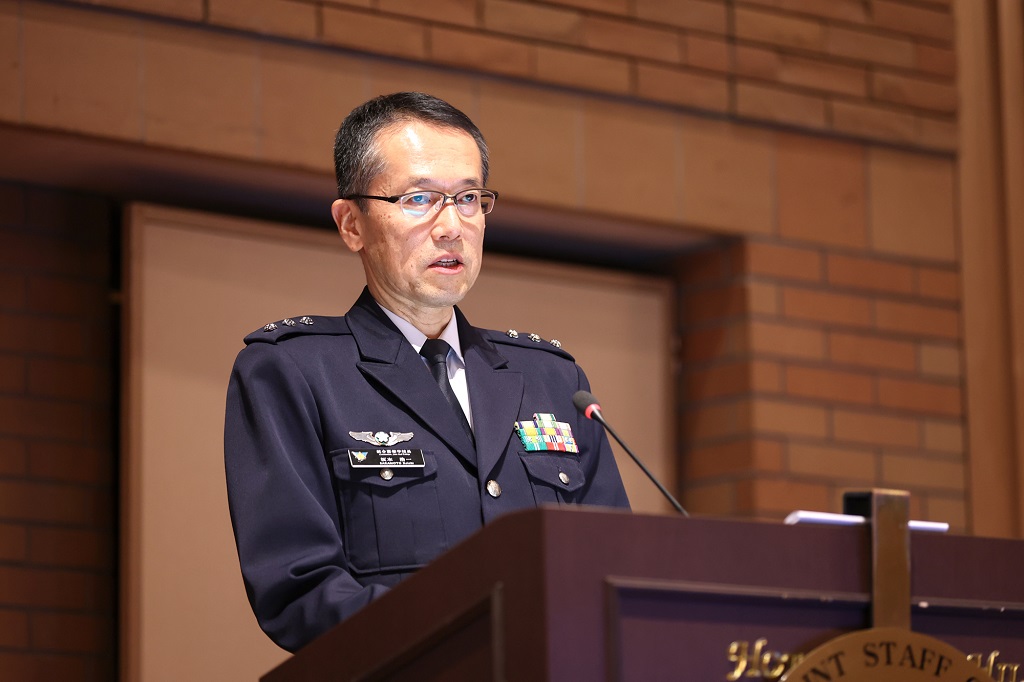
Opening Remarks
(Commandant of the Joint Staff College)
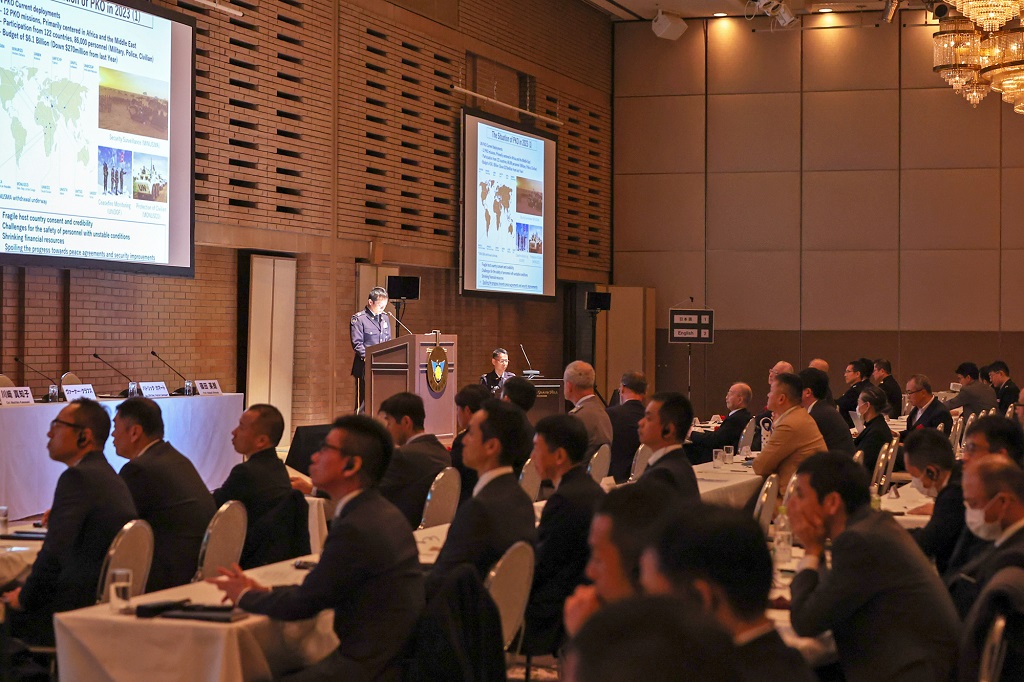
Opening Presentation
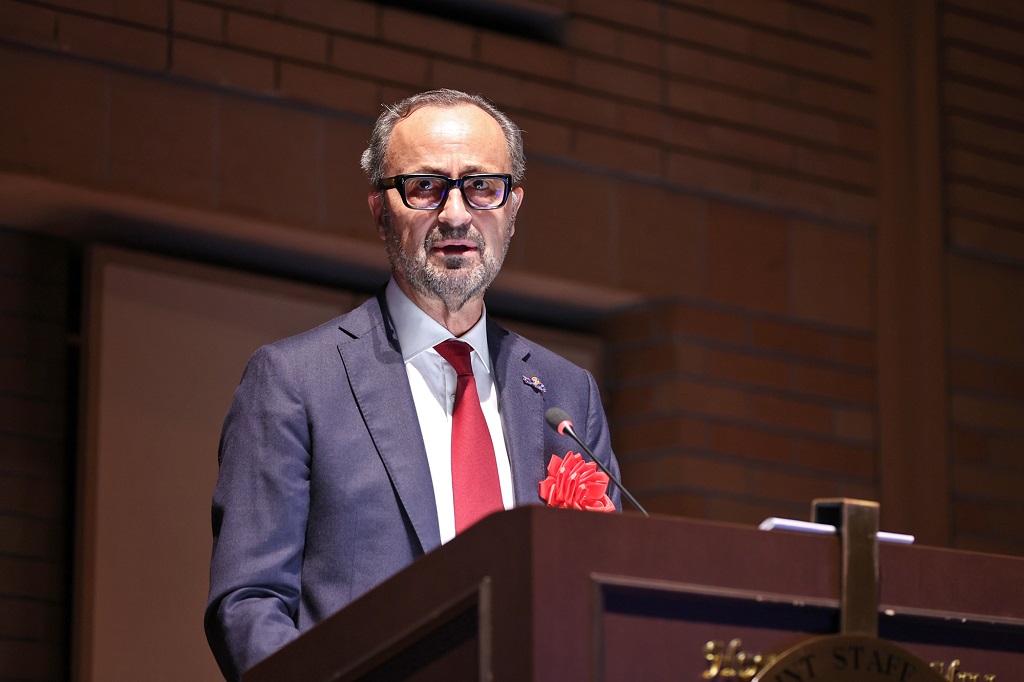
Keynote speaker
Major General (Ret.) Patrick Cammaert
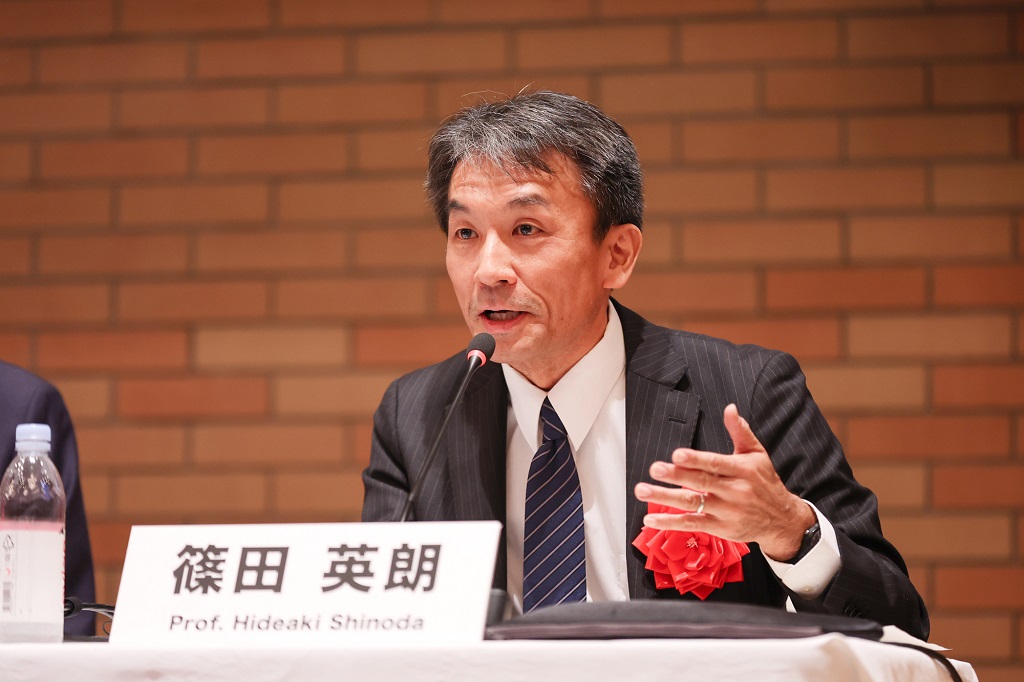
Moderator
Professor SHINODA Hideaki
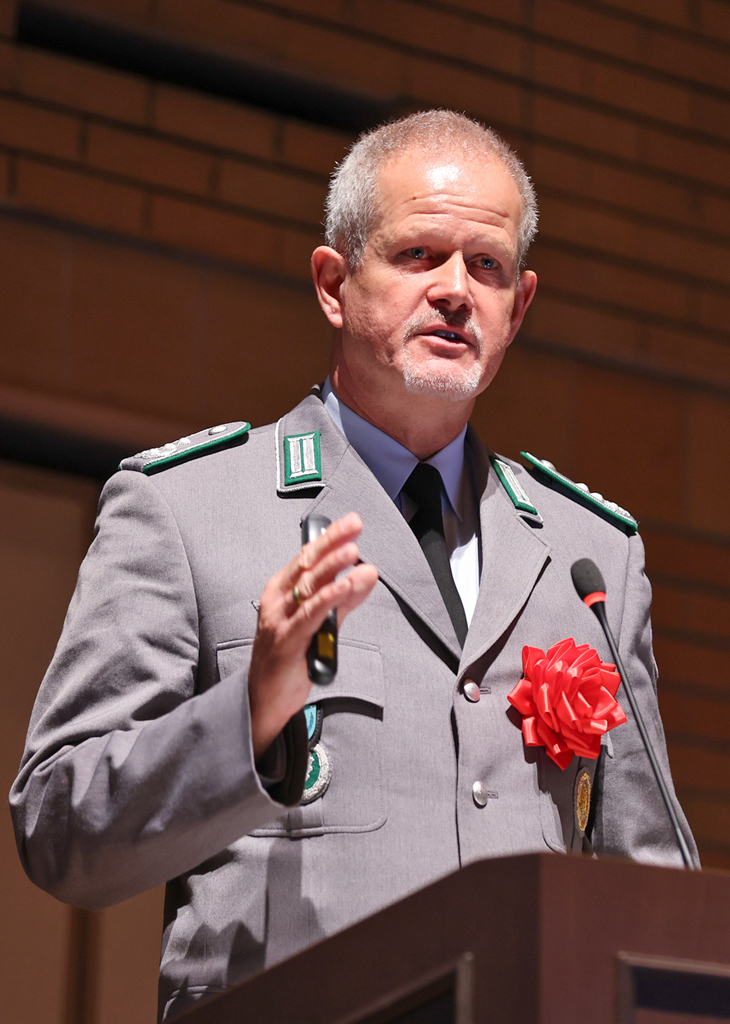
Panelists
Colonel Werner Klaffus
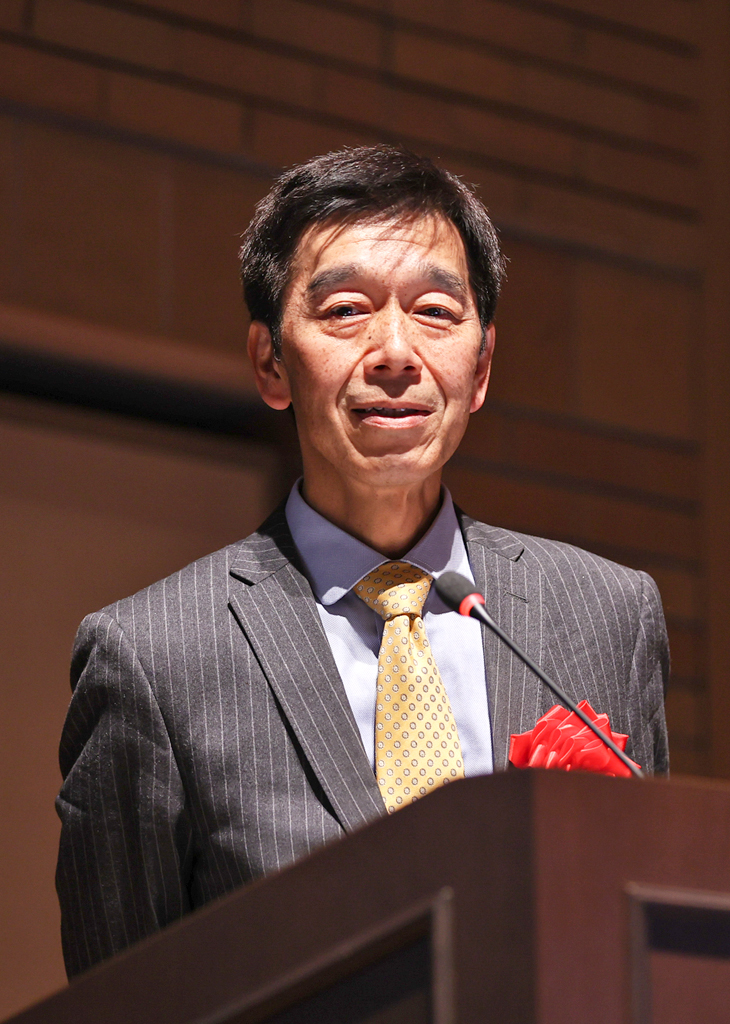
Panelists
Professor YOSHIZAKI Tomonori
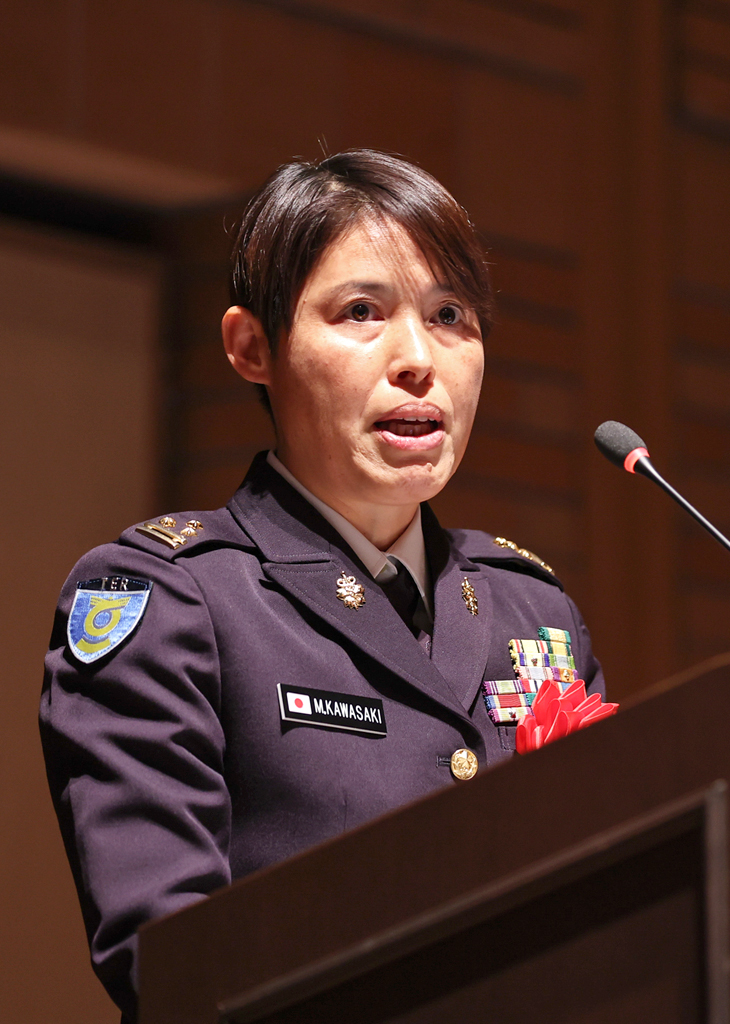
Panelists
Colonel KAWASAKI Machiko
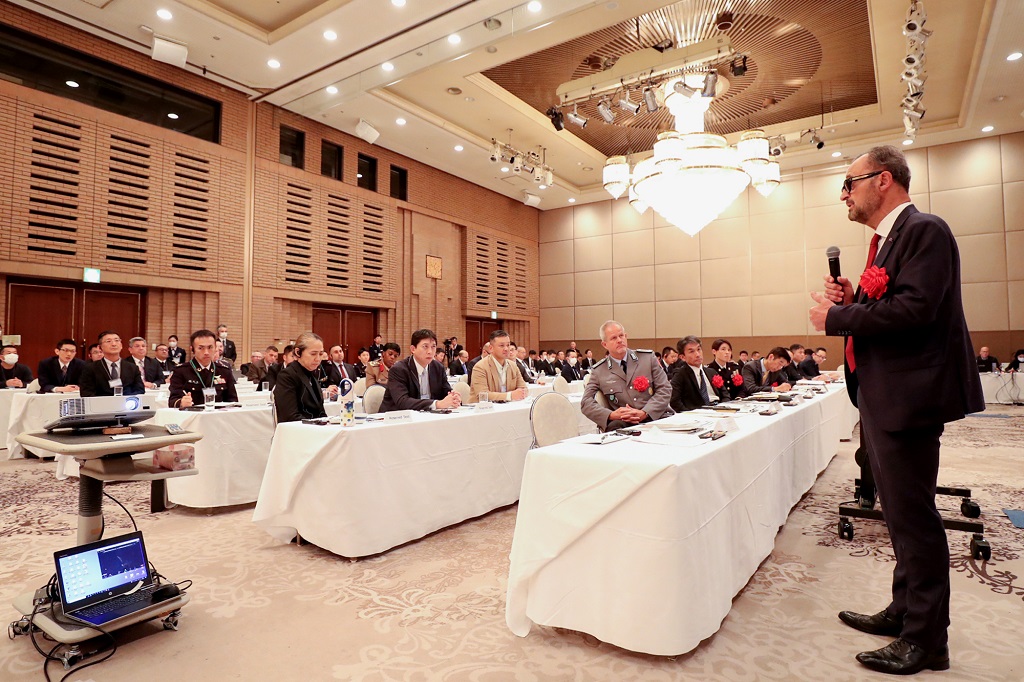
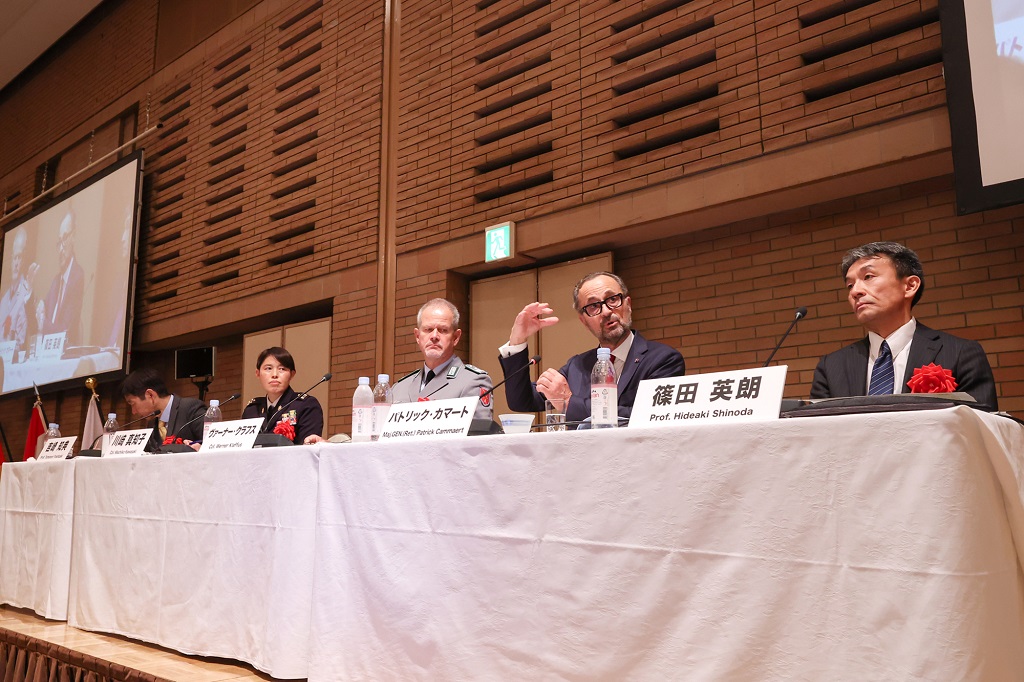
Venue Scenery
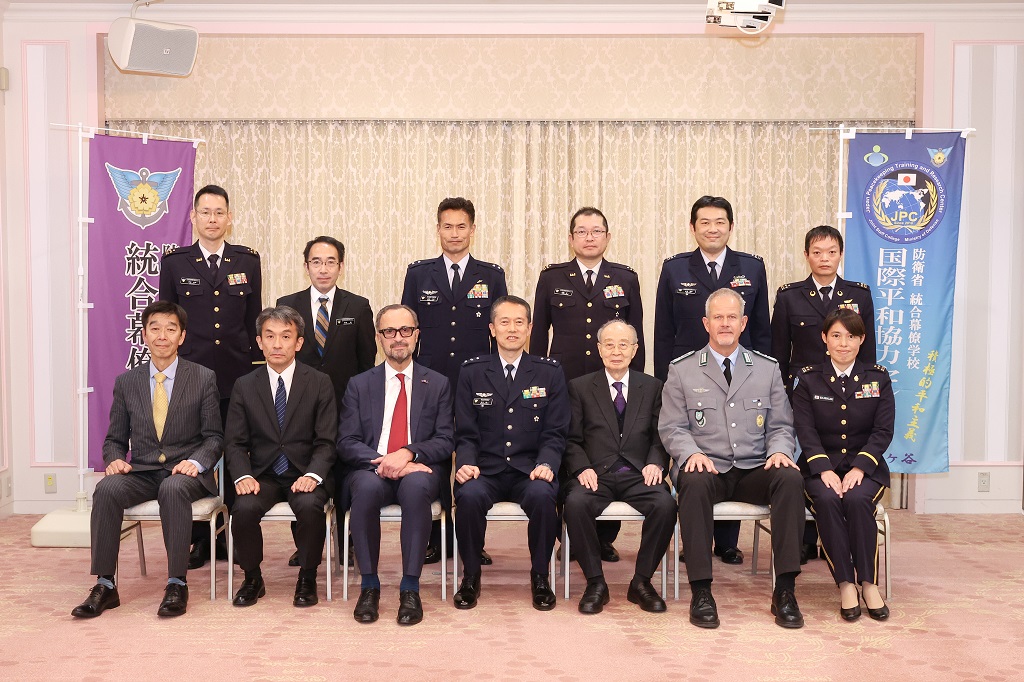
Group Photo for Speakers, Guests and Joint Staff College Staff
◆The proceedings of the symposium
On December 1, 2022, the Joint Staff College hosted the “International Peace and Security Symposium 2022” at Hotel Grand Hill Ichigaya (Shinjuku ward, Tokyo).
This time, we had the general audience participate in the venue under various measures to prevent the spread of COVID-19, and simultaneously delivered online to audiences who were not able to come to the venue, such as overseas.
Given that this year marks the 30th anniversary of the legislation of the PKO Act, the symposium was consisted of two parts. The theme of Part 1 was “Japan’s 30 Years of Contributions and Achievements in UN PKO and related operations. - Looking back on the 30 years of JSDF Int’l Peace Cooperation including UN PKOs”. We invited Mr. WATANABE Takashi (Former Commanding General of Northeastern Army,JGSDF) as a special speaker, Mr. ISOBE Koichi (Former Commanding General of Eastern Army,JGSDF), IMAURA Yuki(Former Commandant of Chemical School, JGSDF) and SHINODA Hideaki (Professor, Graduate School of Global Studies, Tokyo University of Foreign Studies) as panelists.
The theme of Part 2 was “Current and Future Challenges of International Peace Operations ?Recent Efforts and Future international peace cooperation". We invited Mr. YOSHIZAKI Tomonori(Vice president for Academic Affairs, National Institute for Defense Studies, JAPAN), Lt. Col. Ray Scott Crawford (Commanding Officers of the Australian Defense Force Peace Operations Training Center), and Ms. MATSUZAWA Tomoko(Director for Defense Cooperation in the Indo-Pacific Region, Ministry of Defense Japan) as panelists. Professor SHINODA acted as the moderator for both Part 1 and Part 2, promoting panel discussions.
In Part 1, Mr. WATANABE gave a keynote speech based on his experience as the first engineering battalion commander dispatched to Cambodia. In the panel discussion that followed, Mr. ISOBE from the standpoint of "organizer," Mr. IMAURA from the standpoint of "commander," and Professor SHINODA "civilians," delivered presentations based on their respective multifaceted perspectives.
In addition, in the second part, the main language used was changed from Japanese To English in order To promote international information dissemination, and after a video message from Ms. NAKAMITSU Izumi (United Nations Under-Secretary-General and High Representative for Disarmament Affairs) at the beginning,
Mr. YOSHIZAKI from the standpoint of “researcher,” Lt. Col. Crawford from the standpoint of “Australian Army,” and Ms. MATSUZAWA same as “Japanese practitioner” delivered presentations, In succession, fruitful discussion was implemented.
In the plenary discussion, questions by the audience and online participants were introduced, and lively discussions were held based on the experiences of each panelist. Then, Professor SHINODA, the moderator, gave a summary of the discussion at the end of the symposium.
Through this symposium, we looked back on the past ‘accumulation’ of Japan’s international peace cooperation activities and discussed ‘expansion’ of the activities, obtaining valuable suggestions for future efforts.
The achievements of this symposium will be reflected on our future training and research activities in JPC, and the content of discussion will be posted on this website so that everyone can use them for further discussion and study.

Opening Remarks
(Commandant of the Joint Staff College)

Opening Presentation
(Director, Japan Peacekeeping T&R Center)

Video Message from Mr. Prak Sokhonn,
Minister of foreign Affairs and Deputy Prime Minister of Cambodia
Part1

Special Speaker
WATANABE Takashi

Panelists
ISOBE Koichi

Panelists
IMAURA Yuki

Panelists
SHINODA Hideaki
Part2

Video Message from Ms. NAKAMITSU Izumi,
Under-Secretary-General and High Representative for Disarmament Affairs

Panelists
YOSHIZAKI Tomonori

Panelists
Lieutenant Colonel
Leigh Scott Crawford
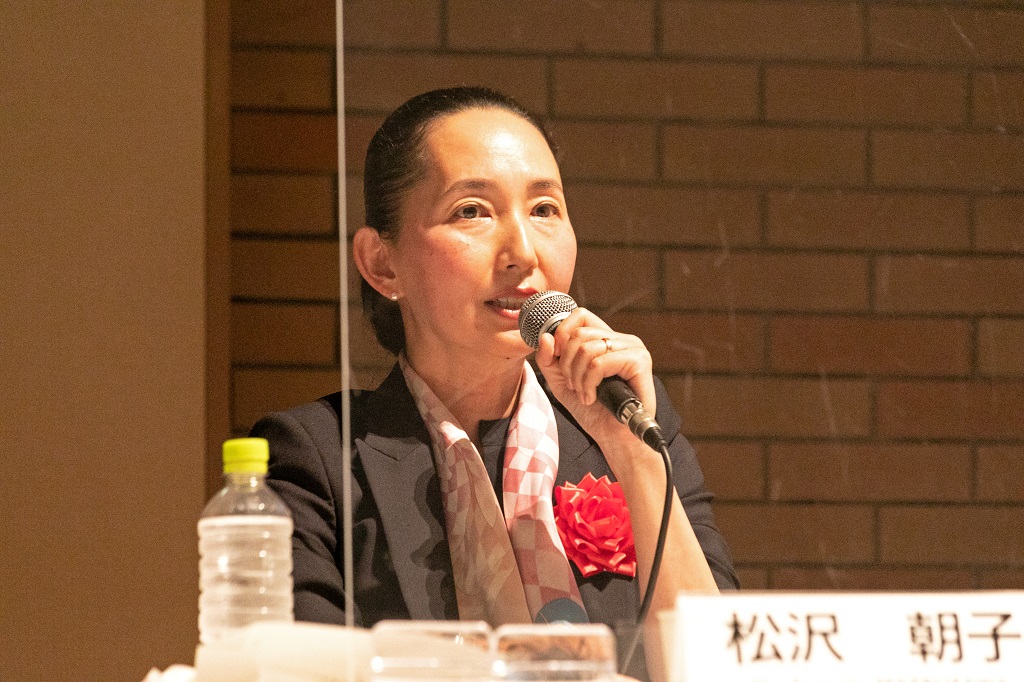
Panelists
MATSUZAWA Tomoko
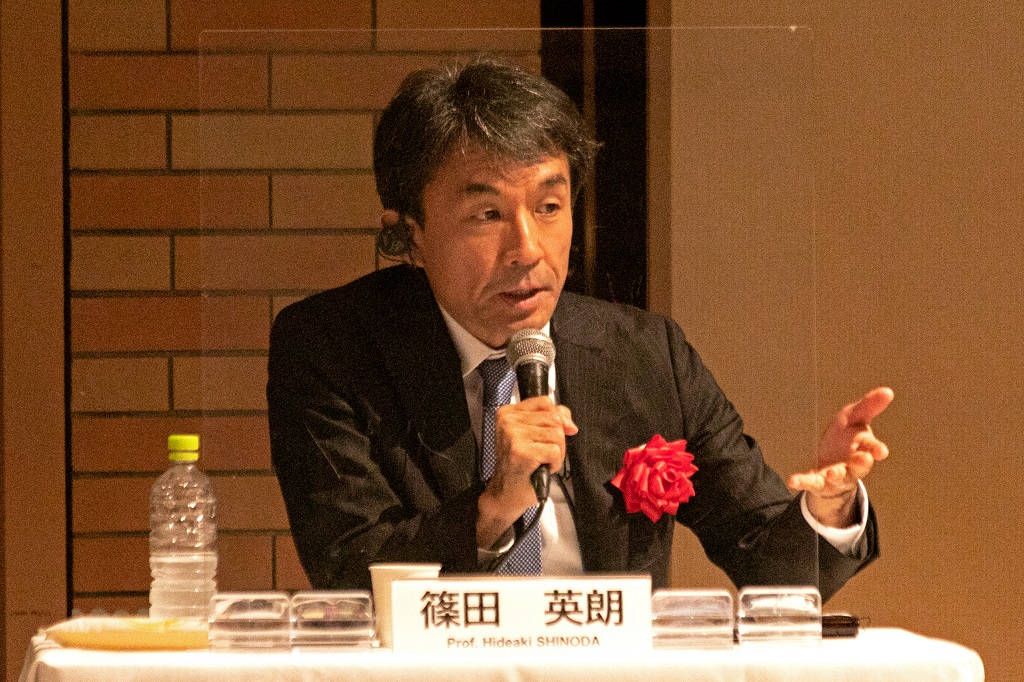
Moderator
SHINODA Hideaki
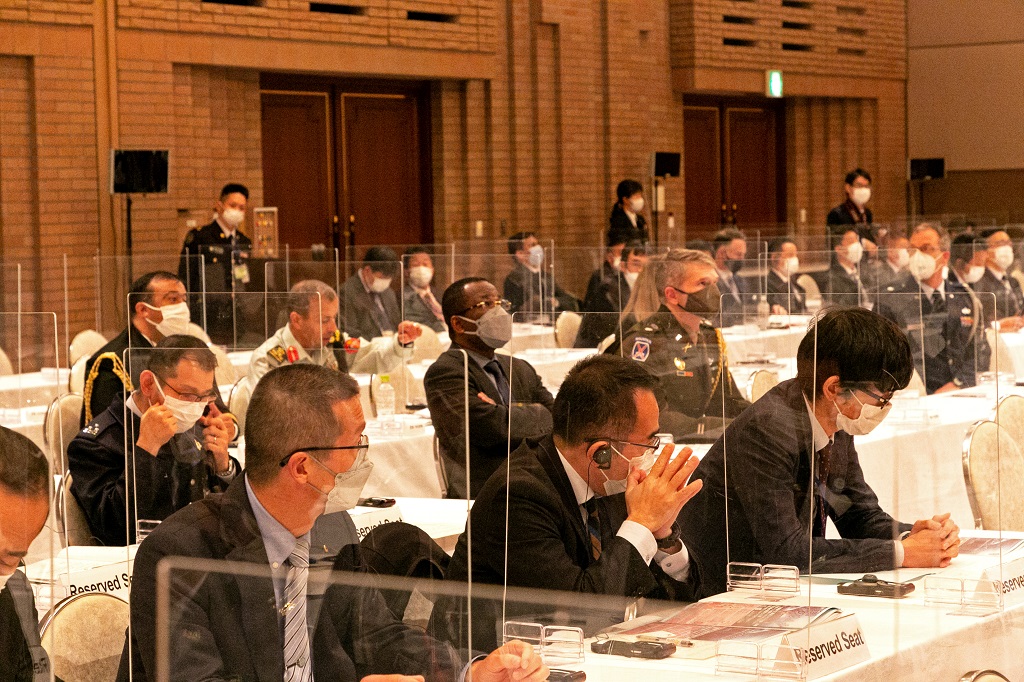
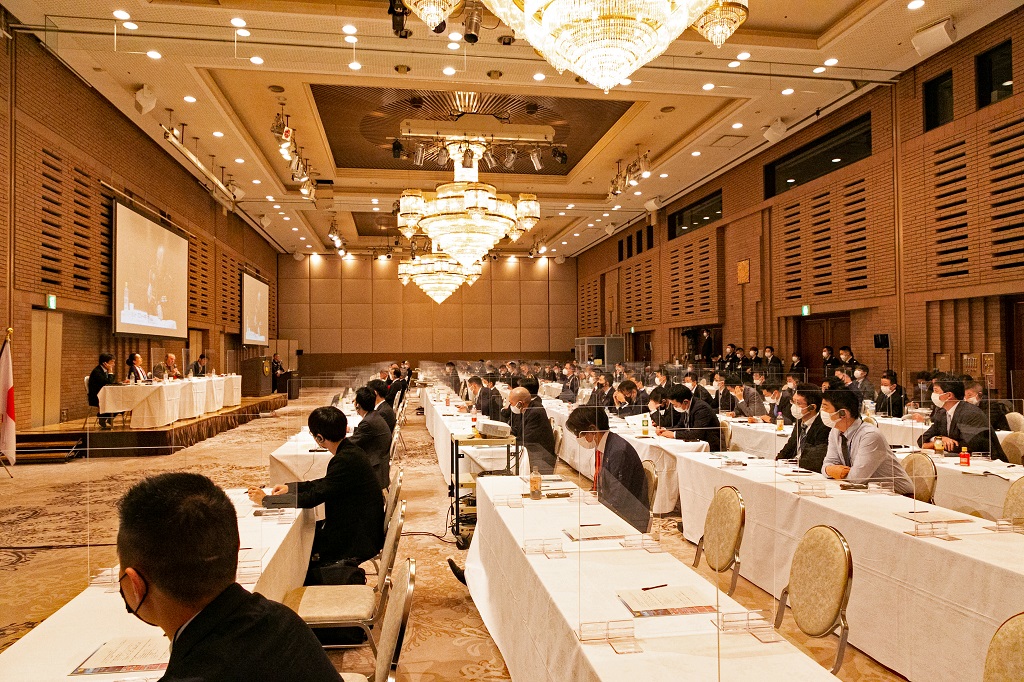
Venue Scenery
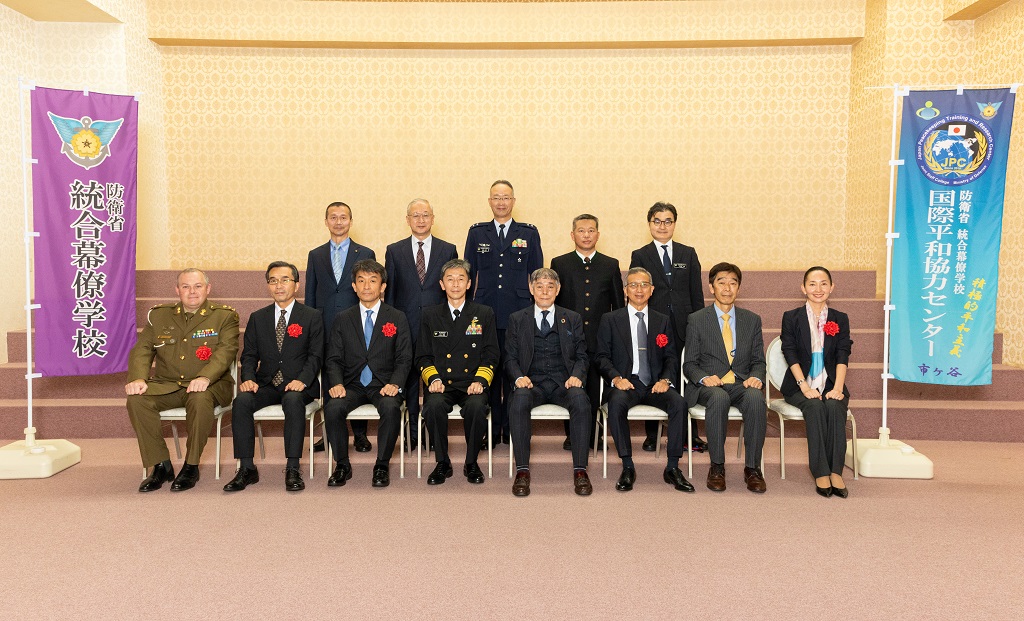
Group Photo for Speakers, Guests and Joint Staff College Staff
◆The proceedings of the symposium
On December 3, 2021, the Joint Staff College hosted the “International Peace and Security Symposium 2021” on the premises of Ministry of Defense in Ichigaya (at the International Conference Hall).
In view of the pandemic, the event adopted a “hybrid mode” this time, where attendees at the venue was limited to the MOD personnel, guests from abroad participated online, and the livestream was delivered to the public.
The theme was “Contribution to International Peace through Partnership Peacekeeping: Significance of International Peace Cooperation in the FOIP Region”, focusing on “partnership” which has been one of the trends in UN efforts in recent year. For the event, we invited Australian Army Major General (Ret.) Cheryl Pearce AM (Former Force Commander, UN Forces in Cyprus) as the keynote speaker, Dr. HAKATA Kei (Professor, Department of Cross-Cultural Studies, Seikei University), Vietnam People’s Amy Major General Hoang Kim Phung (Director, Vietnam Department of Peacekeeping Operations) and JGSDF Lieutenant General (Ret.) MATSUMURA Goro (Former Commanding General, Northeastern Army) as the panelists, and Dr. SHINODA Hideakaki (Professor, Graduate School of Global Studies, Tokyo University of Foreign Studies) as the moderator, having them discuss and make suggestions from their respective viewpoints.
At the beginning of the symposium, Major General Pearce delivered the keynote speech in line with the theme based on her experience as the former Force Commander of United Nations Peacekeeping Force in Cyprus (UNFICYP)suggesting the importance of regional coordination and cooperation in PKO training and provision of equipment.
In the following panel discussion, each panelist gave a presentation from their own viewpoint: Dr. HAKATA from that of the researcher of the FOIP; MG Phung, the Vietnamese military officer who dispatches units to PKO; and LTG MATSUMURA, the expert in the MOD/SDF’s international peace cooperation activities. Then, in the plenary discussion, the panelists had animated debates about future efforts in partnership international peace cooperation centered around questions from participants in the venue and online, which were summarized by the moderator Dr. SHINODA at the end.
Through this symposium, the JPC obtained latest information on the coordination and cooperation of the international community concerning international peace cooperation in the FOIP region as well as valuable suggestions as to Japan’s future efforts.
The achievements of this symposium will be reflected in the JPC’s training and research, and posted on this website to be shared widely so everyone can use them for discussion.


Guests from abroad (online participation)
Keynote speaker: Australian Army Major General (Ret.) Cheryl Pearce AM (left)
Panelist: Vietnam People’s Army Major General Hoang Kim Phung (right)

Moderator
Dr. SHINODA Hideaki

Panelist
Dr. HAKATA Kei

Panelist
LTG (Ret.) MATSUMURA Goro

Online keynote speech

Opening remarks (Commandant Joint Staff College)

Plenary discussion

Guests, Commandant and other staff of the Joint Staff College
◆The proceedings of the symposium
We have decided to cancel the annual International Peace & Security Symposium scheduled for December this year in light of the situations in and out of Japan in relation to the novel coronavirus infections.
We apologize for the inconveniences it may cause and appreciate your understanding.
The Japan Peacekeeping Training and Research Center (JPC) of the Joint Staff College (JSC) hosted the “International Peace & Security Symposium 2019” at the Hotel Grand Hill Ichigaya on December 2.
This time, we set the theme as “New Trends in Peacekeeping Operations by the International Community including the United Nations: International Trends in Peacekeeping Operations,” inviting Col. Tim Wildish*1 as a keynote speaker; Dr. Yamashita Hikaru*2, Lt. Col. Peter Conroy*3 and retired Lt. Gen. Matsumura Goro*4 as panelists; and Dr. Shinoda Hideaki*5 as a moderator of the panel discussion.
In the keynote speech, Col. Tim Wildish read a message on behalf of Lt. Gen. Loitey, military advisor at the UN Department of Peace Operations, addressing challenges facing the UN peacekeeping operations, expectations for Japan and the future vision.
In the following panel discussion, the panelists gave presentations from their respective standpoints: Dr. Yamashita Hikaru as a researcher specializing in peace operations, Col. Peter Conroy as a working level officer who take control of education and training at the Australian Defence Forces Peace Operations Training Centre, and retired Lt. Gen. Matsumura Goro as an expert in MOD/SDF’s activities in peacekeeping operations.
In the plenary discussion that followed, the panelists had active discussions on Japan’s future activities in relation to peacekeeping operations, centered around questions raised by the visitors to the symposium, and the moderator Dr. Shinoda summarized the discussions in the end.
Through this symposium, the JPC obtained latest information on the efforts the international community including the United Nations makes in peacekeeping operations as well as valuable suggestions as to Japan’s possible future activities.
The results from this symposium will be reflected in the JPC’s training and research, and posted on this website to be used widely as a reference.
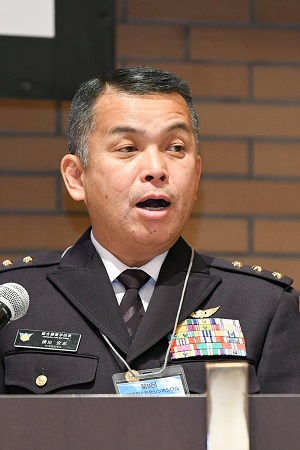
Opening Remarks
(Lt. Gen. Kiyota: Commandant, JSC)
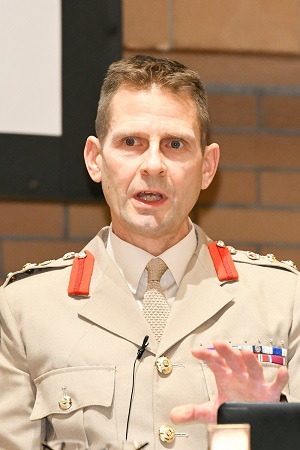
Keynote Speaker and panelist
(Col. Wildish)
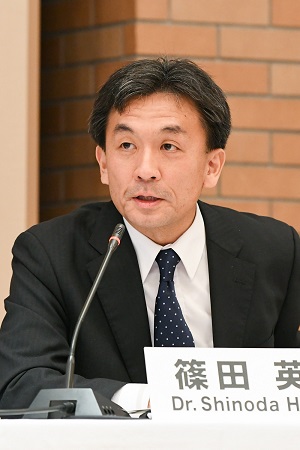
Moderator
(Dr. Shinoda)
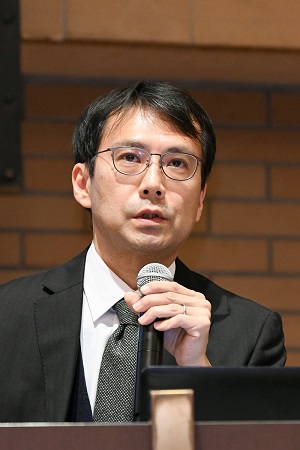
Panelist
(Dr. Yamashita)
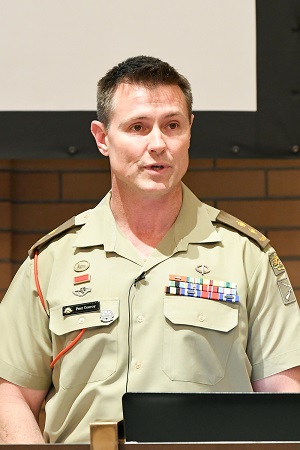
Panelist
(Lt. Col. Conroy)

Panelist
(Lt. Gen (ret.) Matsumura)
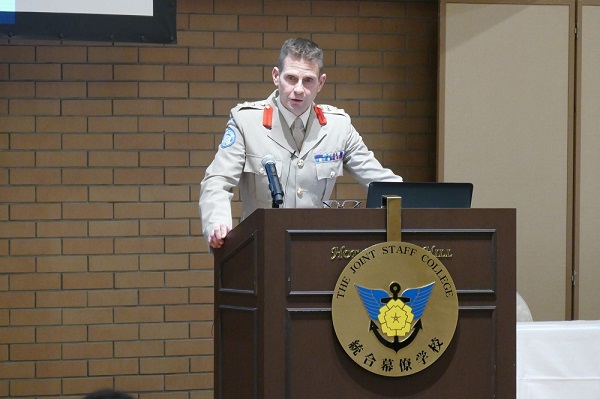
Col. Wildish delivering the keynote speech
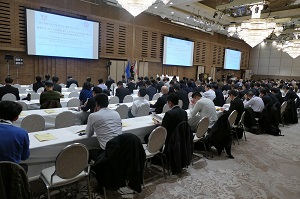
Venue
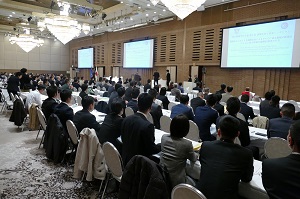
Venue

Guest speakers and JPC staff including the JSC commandant
◆The proceedings of the symposium
The Japan Peacekeeping Training and Research Center (JPC) held the “International Peace & Security Symposium 2018” at the Belle Salle Tokyo Nihonbashi on 30 November.
Under the theme of “Trends in Modern PKO and Capacity-Building Assistance of Peacekeepers -Japan’s contribution to PKO Capacity-Building of Conflict-affected African states-”, we invited AVM Griffiths S. Evans*1 to be the keynote speaker, Ms. Sumie Nakaya*2, LTC Shigeki Matsui*3, Mr. Scott A. Weidie*4, Mr. Shahedul A. Khan*5, Dr. Emmanuel K. Aning*6 and Ms. Tomoko Matsuzawa*7 as panelists, and Dr. Hideaki Shinoda*8 as a moderator of the panel discussion, and they expressed their views from various aspects.
First, AVM Griffiths S. Evans gave the keynote speech from the standpoint of “a source of needs for capacity building assistance” and said “Africa’s security landscape has changed dramatically over the past two decades. Nonetheless, the capacity of peacekeepers to respond to these changes remains a challenge”, pointing out the weaknesses with regard to response to asymmetric threats such as violent extremist and terrorist groups, search and detection of IEDs, and intelligence gathering.
Then, four panelists made presentations based on their professional perspectives: Ms. Nakaya as “UNDPKO political affairs officer in charge of African matters”, LTC Matsui as “Instructor delegation chief of capacity-building in Kenya”, Mr. Weidie as “US GPOI Program Manager” and Mr. Kahn as “Bangladesh civil police”.
In the panel discussion, the panelists had active discussions on the challenges and future trends in the capacity building assistance, based on the issues raised by Ms. Matsuzawa and Dr. Aning and questions from the visitors. To conclude, the moderator Dr. Shinoda summarized the discussion.
Through the symposium, the JPC was able to deepen the knowledge of the latest international trends in the capacity building assistance in Africa.
The JPC intends to reflect the gains from this seminar in the future training and research activities and share the discussion results widely by posting them on the website.

Venue and AVM Griffiths S. Evans (center)

Classroom scene 1

Classroom scene 2

Opening Remarks
(Commandant of the JSC)

Keynote speaker
(AVM Griffiths S. Evans)

Moderator
(Dr. Hideaki Shinoda)

Panelist
(Ms. Sumie Nakaya)

Panelist
(LTC Shigeki Matsui)

Panelist
(Mr. Scott A. Weidie)

Panelist
(Mr. Shahedul A. Khan)

Panelist
(Dr. Emmanuel K. Aning)

Panelist
(Ms. Tomoko Matsuzawa)

Invited researchers and school officials
◆The proceedings of the symposium
The Japan Peacekeeping Training and Research Center (JPC) held the “International Peace & Security Symposium 2017” at the Belle Salle Tokyo Nihonbashi on 15 December 2017.
Under the theme of “How to Protect the Vulnerable Under Armed Conflict: Focusing on the Protection of Children”, we invited Ms. Tasha Gill (Senior Advisor, Child Protection in Emergencies, Programme Division, UNICEF HQ) to be the keynote speaker, and Dr. Yasushi Katsuma (Professor, International Studies Program, Graduate School of Asia-Pacific Studies, Waseda University), Ms. Rumiko Seya (President of the Japan Center for Conflict Prevention) and Lieutenant Colonel Darleen Young (Gender & Protection Officer, Peace Operations Training Centre, Australian Defence Force) as panelists. Dr. Hideaki Shinoda (Professor, International Studies Program, Graduate School of Global Studies, Tokyo University of Foreign Studies) acted as a moderator of the panel discussion.
Placing a focus on the child protection, we realized again what a dire situation they are being put in under armed conflicts and had a meaningful discussion on how we should approach this issue and work for resolutions. The symposium enabled us to deepen our understanding of the roles which the military component of UN PKO should assume in the field of child protection and of education and training which participating countries are expected to offer. The issue of civil-military relations was also presented from the NGO’s perspective.
Throughout this year’s symposium, a high level of expectations were placed on the enhancement of training and research functions of the JPC, Joint Staff College.
In order to fulfill these expectations from inside and outside of the Ministry of Defense, we will strive to deepen our research activities and promote our training programs.

Opening Remarks (Commandant of the JSC)

Keynote Speech by Ms. Tasha Gill

Panel Discussion
(Dr. Katsuma, Ms. Seya, Lt Col Young,
Ms. Gill, Dr. Shinoda from the left)

Symposium Hall
The Japan Peacekeeping Training and Research Center (JPC) held the “International Peace & Security Symposium 2016” at the Bellesalle Shinjuku Grand Conference Center in Tokyo, on 16 December.
Under the theme of “Challenges and Innovations in Contemporary PKO: Focusing on the Protection of Civilians (POC)”, we invited Dr. Michael Heller Chu (Senior Political Affairs Officer, Department of PKO, United Nations) to be the keynote speaker, and Ms. Amy Sheridan (Assistant Director of Civil-Military Policy and Stabilisation Section, Department of Foreign Affairs and Trade, Australia) and Dr. Hideaki Shinoda (Professor, Graduate School of Global Studies, Tokyo University of Foreign Studies) as panelists. COL Hiroyuki Ogura (Senior Research Officer, JPC) was also present as a panelist. Dr. Toshiya Hoshino, (Professor, Osaka School of International Public Policy, Osaka University) acted as a moderator of the panel discussion and wrapped up the symposium with some final remarks.
Covering the future prospects for POC drawn from the conditions and challenges of the modern UN peacekeeping activities, we had productive discussions on various POC issues that are now confronting us. When it comes to POC, we tend to focus on providing physical protection, but this symposium reminded us that POC can only become effective through a comprehensive approach including promotion of political process (dialogue and commitment), provision of physical protection, and creation of environment for protection. We also had a shared understanding on who the objects of protection are, the importance of building trust with local residents and the meaning of discussing POC.
Throughout this year’s symposium, a high level of expectations were placed on the enhancement of training and research functions of the JPC.
In order to fulfill these expectations from inside and outside of the MOD, we will strive to deepen our research activities and promote our training programs.

Opening Remarks (Commandant of the JSC)

Keynote Speech (Dr. Chu)

Panel Discussion

Concluding Lecture (Dr. Hoshino)
The Japan Peacekeeping Training and Research Center (JPC) of the Joint Staff College held the “International Peace & Security Symposium 2015” at the Bellesalle Tokyo Nihombashi in Tokyo, on 20 November 2015.
Under the theme of this year’s symposium: “UN Peacekeeping Operations for Sustainable Peace,” we invited Ms. Renata Dwan (Head, Peace Operations Team, Executive Office of the UN Secretary-General) to be the keynote speaker, and Dr. Toshiya Hoshino (Vice President for Global Engagement, Osaka University) to act as moderator of the panel discussion, and to wrap up the symposium with some final remarks. We also invited the following distinguished guests to be panelists: Mr. Jeremie Bodin (General Director of Medecins Sans Frontieres Japan), Dr. Hideaki Shinoda (Professor, Tokyo University of Foreign Studies), and Ms. Ikuko Natori (Director, Overseas & Domestic Programs/Operations, Association for Aid and Relief, Japan).
Focusing on United Nations’ Security Council Resolution No. 2086, adopted in 2013, while keeping in mind the latest information from reports such as the 2015 High-Level Independent Panel on Peace Operations, we had productive discussions on the changes and challenges UN peacekeeping operations face. In order to implement closer cooperation and coordination among peacekeeping and associated organizations, even while conflicts are becoming more complicated, we addressed the need for a change in our awareness was discussed. Under these circumstances, it is expected that PKO organizations will assist host countries, along with civil organizations, in developing peacebuilding capacity at an early stage. Taking this into account, we shared an understanding of the important role for the PKO organizations in conducting research on, and training for, peacebuilding activities.
Throughout this year’s symposium, we recognized there will be a high level of expectation placed on our activities from here on after, including promoting civil-military coordination, and providing training not only for peacekeeping, but also for peacebuilding.
In order to fulfill these expectations, we will strive to deepen our research activities and promote our training programs.
Program for International Peace & Security Symposium 2015
“UN Peacekeeping Operations for Sustainable Peace”
| 13:00‐13:10 | Opening remarks | Vice Admiral Katsuo Takahashi (Commandant, Joint Staff College, Ministry of Defense) |
| 13:10‐13:55 | Keynote speech | Ms. Renata Dwan (Head, Peace Operations Team, Executive Office of the Secretary-General, United Nations) |
| 14:10‐16:30 | Panel Discussion | |
| Moderator | Dr. Toshiya Hoshino (Vice President for Global Engagement, Osaka University) |
|
| Panelists | Mr. Jeremie Bodin (General Director of Medecins Sans Frontieres Japan) |
|
| Dr. Hideaki Shinoda (Professor, Tokyo University of Foreign Studies) |
||
| Ms. Ikuko Natori (Director, Overseas& Domestic Programs/Operations, Association for Aid and Relief, Japan) |
||
| Ms. Renata Dwan | ||
| 16:45‐17:15 | Concluding Lecture | Dr. Toshiya Hoshino |
| 17:15‐17:20 | Closing remarks | Vice Admiral Katsuo Takahashi |

Opening Remarks

Keynote speech

Panel Discussion

Concluding Lecture
The Japan Peacekeeping Training and Research Center (JPC), the Joint Staff College, held the "International Peace & Security Symposium 2014" at the Bellesalle Shinjuku Grand Conference Center, Tokyo, on 5 December, 2014.
It was our fourth time holding this symposium through which we seek to contribute to Japan’s international peacekeeping activities,
including education and planning support, by reflecting upon and sharing the knowledge held among the MOD and other related officials.
The symposium features speeches and the exchange of opinions between our distinguished guests.
At this year’s symposium we focused on "Civil-Military Coordination in Complex Emergencies." We discussed how civilian and military organizations should work together, since there are an increasing number of large-scale humanitarian crises caused by domestic and international conflicts throughout the world. This theme was chosen since the civil-military coordination related to humanitarian support activities in conflict areas, such as Mali, Syria, Central Africa and the South Sudan, has become a frequently highlighted challenge.
We invited the following guests to be speakers and panelists, since they have an abundance of knowledge and experience in the subject.
Lieutenant General Maqsood AHMED, Military Adviser, UN Department for Peacekeeping Operations (DPKO); Ms. Sophie SOLOMON,
UN Office for the Coordination of Humanitarian Affairs (OCHA), Mali; Mr. Hideki TSUCHIMOTO, Deputy Director-General of International Peace Cooperation Headquarters,
Cabinet Office; Mr. Jeremie BODIN, General Director of Medecins Sans Frontieres Japan; and Ms. Rika YAMAMOTO, Director of Program Department, Peace Winds Japan.
We also invited Dr. Toshiya HOSHINO, Vice President for Global Engagement, Osaka University, to act as the panel discussion moderator, and to help wrap up the symposium.
The symposium used the civil-military coordination effort in Mali as a case study. The early establishment of a civil-military coordination function, its deployment, and the sharing of a common humanitarian position were all highlighted as success factors for this particular humanitarian assistance mission. We had a very fruitful discussion about military escorts for civilians, the implementation of Quick Impact Projects (QIP), which offer rapid improvement to the living conditions of affected people, the need for pro-deployment training, and an integrated mission structure.
In order to deal with "the need for cooperation among multi-stakeholders (civilian, military and affected people) and its difficulties," which is the fundamental aspect of civil-military coordination, it is necessary for both civilian and military personnel to adopt practical and flexible measures. In this context, it was once more affirmed that joint training between civilian and military personnel before an operation was conducted was necessary. Such training would share best practices from past civil-military cooperation efforts, would deepen mutual understanding, would provide better expectations of each other, and promote mutual respect and awareness.
Throughout this year’s symposium, there was a high level of expectation placed on the JPC to be a leading player in providing education, training and research which can be used for international peacekeeping activities beyond complex disaster relief operations, and to facilitate Japanese teamwork for international peacekeeping activities. In order to fulfill these expectations, we will make an utmost effort to promote the education we offer.

Opening Remarks

Opening and Keynote Speech

Panel Discussion

Concluding Lecture
・・・ Preliminary Drafts・・・
International Peace & Security Symposium 2013 was held at Belle Salle Shinjuku Grand Conference Center on 6 December 2013. Japan Peacekeeping Training and Research Center would like to say thank you to all who attended the symposium.




・・・ Preliminary Drafts・・・
International Peace & Security Symposium 2012 was held at Hotel New Otani, Tokyo, on 17 November 2012. Preliminary drafts and presentation materials are available on the links below.
◆The proceedings of the symposium
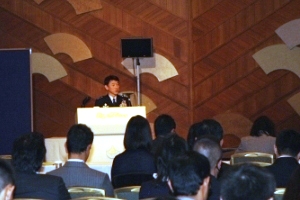

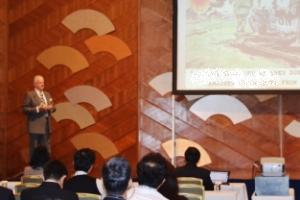
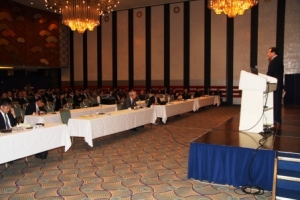
・・・ Preliminary drafts・・・
・・・ Presentation Materials・・・
International Peace & Security Symposium 2011 was held on 7 and 8 November 2011. Abstracts of the symposium are available on the links below.


・・・ Preliminary drafts・・・
Japan Peacekeeping Training & Research Center
Joint Staff College, MOD
F-2 Building 1F, 5-1 Ichigayahonmura-cho,
Shinjuku-ku, Tokyo 162-8805
TEL: +81-3-3268-3111